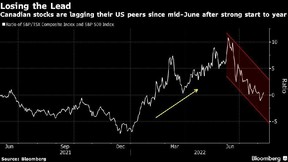Article content
One of Canada’s largest asset managers is paring its wager on the country’s stock market amid growing concern that a global recession could weigh more heavily on the nation’s shares.

[ad_1]
‘Canadian equities — given their more highly cyclical nature — could underperform’
Author of the article:
Bloomberg News
Stefanie Marotta

One of Canada’s largest asset managers is paring its wager on the country’s stock market amid growing concern that a global recession could weigh more heavily on the nation’s shares.
This advertisement has not loaded yet, but your article continues below.
Mackenzie Investments, which oversees $196 billion, downgraded its position on Canadian equities to neutral from overweight last week, citing concerns that efforts by policy makers around the world to stave off rising prices will drag down economic output.
“A lot of the cues that we’re seeing around the global economy, including the commitment to fighting inflation with higher interest rates and the speed at which the interest rate moves are happening, made us more cautious about the extent of the slowdown,” Lesley Marks, Mackenzie’s chief investment officer of equities, said in an interview. “Canadian equities — given their more highly cyclical nature — could underperform.”
Marks said Canada is particularly vulnerable to a slump in global commodity prices, which are already showing signs of weakness. Energy stocks have tumbled from their peak earlier this year and could continue to slide as consumer demand for oil and gas slumps, Marks said.
This advertisement has not loaded yet, but your article continues below.



In addition, a chill has fallen over Canada’s once-scorching housing market, a critical part of the nation’s economy, as mortgage rates surge. Canadians tie their level of wealth to their homes and, as prices fall, so will consumer willingness to spend on big ticket items, denting earnings, she added.
“Housing prices have corrected significantly over the last four months and that has an impact on the balance sheet of Canadians, but also on consumer confidence,” Marks said.
At the same time, Mackenzie is boosting its outlook on U.S. shares to neutral from underweight. While Canada’s benchmark S&P/TSX Composite index has handily outpaced the S&P 500 this year, the growth-stock heavy U.S. gauge has been regaining ground in recent weeks amid better-than-expected earnings, narrowing the gap between the two to the smallest since February. The S&P/TSX is about eight per cent lower this year, while the S&P 500 has slumped 14 per cent.
This advertisement has not loaded yet, but your article continues below.

Still, others see Canadian stocks continuing to outperform in the coming months.
BMO Capital Markets’ chief investment strategist Brian Belski has maintained his 24,000 year-end target on the S&P/TSX — an upside of more than 20 per cent — saying that investors have already priced in a potential recession.
“A hawkish Bank of Canada fighting elevated inflation, record-setting gas prices, and rising concerns of recession have many investors cautious on the consumer discretionary sector,” Belski wrote in a note last week. “While these risks are certainly meaningful headwinds for the consumer, our work shows they have been largely priced in, with the sector reaching extreme levels of underperformance in early July, while valuations have normalized to historical averages.”
This advertisement has not loaded yet, but your article continues below.
Sign up to receive the daily top stories from the Financial Post, a division of Postmedia Network Inc.
A welcome email is on its way. If you don’t see it, please check your junk folder.
The next issue of Financial Post Top Stories will soon be in your inbox.
We encountered an issue signing you up. Please try again
[ad_2]
Image and article originally from financialpost.com. Read the original article here.